2世纪大学英语课文翻译unit
2023年度21世纪大学英语综合教程第二册Unit2课文翻译及课后答案,3篇
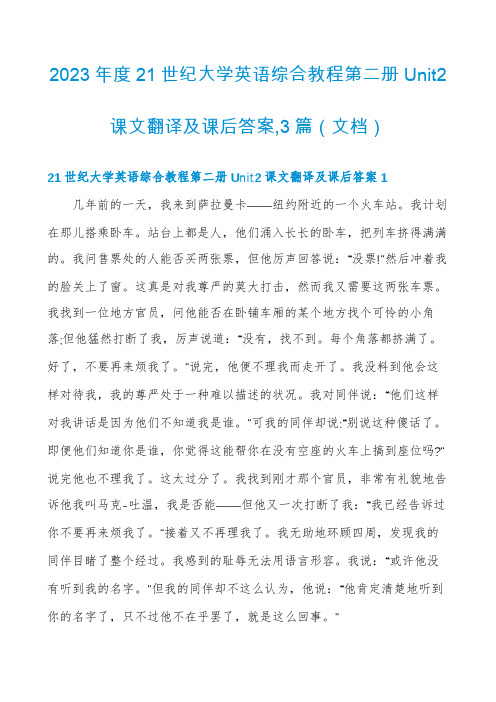
2023年度21世纪大学英语综合教程第二册Unit2课文翻译及课后答案,3篇(文档)21世纪大学英语综合教程第二册Unit2课文翻译及课后答案1 几年前的一天,我来到萨拉曼卡——纽约附近的一个火车站。
我计划在那儿搭乘卧车。
站台上都是人,他们涌入长长的卧车,把列车挤得满满的。
我问售票处的人能否买两张票,但他厉声回答说:“没票!”然后冲着我的脸关上了窗。
这真是对我尊严的莫大打击,然而我又需要这两张车票。
我找到一位地方官员,问他能否在卧铺车厢的某个地方找个可怜的小角落;但他猛然打断了我,厉声说道:“没有,找不到。
每个角落都挤满了。
好了,不要再来烦我了。
”说完,他便不理我而走开了。
我没料到他会这样对待我,我的尊严处于一种难以描述的状况。
我对同伴说:“他们这样对我讲话是因为他们不知道我是谁。
”可我的同伴却说:“别说这种傻话了。
即便他们知道你是谁,你觉得这能帮你在没有空座的火车上搞到座位吗?”说完他也不理我了。
这太过分了。
我找到刚才那个官员,非常有礼貌地告诉他我叫马克-吐温,我是否能——但他又一次打断了我:“我已经告诉过你不要再来烦我了。
”接着又不再理我了。
我无助地环顾四周,发现我的同伴目睹了整个经过。
我感到的耻辱无法用语言形容。
我说:“或许他没有听到我的名字。
”但我的同伴却不这么认为,他说:“他肯定清楚地听到你的名字了,只不过他不在乎罢了,就是这么回事。
”我不知道接下去会发生什么,但就在这时候,我注意到一个年轻的卧车行李搬运工正在跟列车员窃窃私语,并朝着我点头。
那个列车员随即转过身,毕恭毕敬地向我走来。
“我能为您效劳吗,先生?”他说道,“您要在卧车上找个空位吗?”“呃,当然,”我回答说,“可我问过站台上那个人,他说每个角落都塞满了,还叫我不要烦他。
”“不会吧,先生,我简直不敢相信他说了这样的话。
简直无法想象有人竟然这样对您说话,先生!我很抱歉,先生,但您一定是误会他了。
我们什么空地方都没了,只剩下那个大的家庭包房,里面有两个铺位和几把扶手椅,但这一切都供您享用。
新世纪大学英语阅读教程2课文翻译
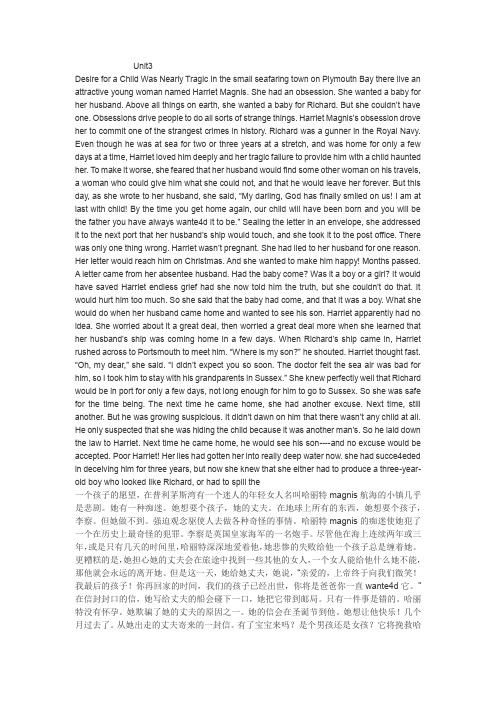
Unit3Desire for a Child Was Nearly Tragic In the small seafaring town on Plymouth Bay there live an attractive young woman named Harriet Magnis. She had an obsession. She wanted a baby for her husband. Above all things on earth, she wanted a baby for Richard. But she couldn’t have one. Obsessions drive people to do all sorts of strange things. Harriet Magnis’s obsession drove her to commit one of the strangest crimes in history. Richard was a gunner in the Royal Navy. Even though he was at sea for two or three years at a stretch, and was home for only a few days at a time, Harriet loved him deeply and her tragic failure to provide him with a child haunted her. To make it worse, she feared that her husband would find some other woman on his travels, a woman who could give him what she could not, and that he would leave her forever. But this day, as she wrote to her husband, she said, “My darling, God has finally smiled on us! I am at last with child! By the time you get home again, our child will have been born and you will be the father you have always wante4d it to be.” Sealing the letter in an envelope, she addressed it to the next port that her husband’s ship would touch, and she took it to the post office. There was only one thing wrong. Harriet wasn’t pregnant. She had lied to her husband for one reason. Her letter would reach him on Christmas. And she wanted to make him happy! Months passed.A letter came from her absentee husband. Had the baby come? Was it a boy or a girl? It would have saved Harriet endless grief had she now told him the truth, but she couldn’t do that. It would hurt him too much. So she said that the baby had come, and that it was a boy. What she would do when her husband came home and wanted to see his son. Harriet apparently had no idea. She worried about it a great deal, then worried a great deal more when she learned that her husband’s ship was coming home in a few days. When Richard’s ship came in, Harriet rushed across to Portsmouth to meet him. “Where is my son?” he shouted. Harriet thought fast. “Oh, my dear,” she said. “I didn’t expect you so soon. The doctor felt the sea air was bad for him, so I took him to stay with his grandparents in Sussex.” She knew perfectly well that Richard would be in port for only a few days, not long enough for him to go to Sussex. So she was safe for the time being. The next time he came home, she had another excuse. Next time, still another. But he was growing suspicious. It didn’t dawn on him that there wasn’t any child at all. He only suspected that she was hiding the child because it was another man’s. So he laid down the law to Harriet. Next time he came home, he would see his son----and no excuse would be accepted. Poor Harriet! Her lies had gotten her into really deep water now. she had succe4eded in deceiving him for three years, but now she knew that she either had to produce a three-year-old boy who looked like Richard, or had to spill the一个孩子的愿望,在普利茅斯湾有一个迷人的年轻女人名叫哈丽特magnis航海的小镇几乎是悲剧。
新世纪英语综合教程第二版unit2全文翻译
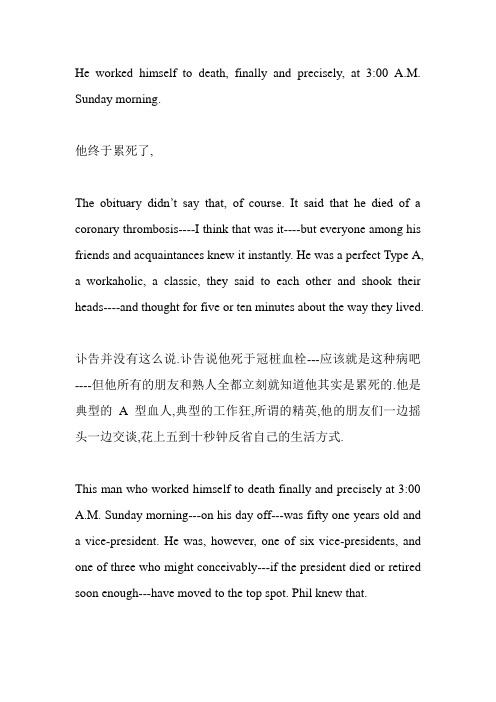
He worked himself to death, finally and precisely, at 3:00 A.M. Sunday morning.他终于累死了,The obituary didn’t say that, of course. It said that he died of a coronary thrombosis----I think that was it----but everyone among his friends and acquaintances knew it instantly. He was a perfect Type A, a workaholic, a classic, they said to each other and shook their heads----and thought for five or ten minutes about the way they lived.讣告并没有这么说.讣告说他死于冠桩血栓---应该就是这种病吧----但他所有的朋友和熟人全都立刻就知道他其实是累死的.他是典型的A型血人,典型的工作狂,所谓的精英,他的朋友们一边摇头一边交谈,花上五到十秒钟反省自己的生活方式.This man who worked himself to death finally and precisely at 3:00 A.M. Sunday morning---on his day off---was fifty one years old and a vice-president. He was, however, one of six vice-presidents, and one of three who might conceivably---if the president died or retired soon enough---have moved to the top spot. Phil knew that.那累死在周日凌晨三点---这天是他的假期---的死者今年51岁, 是一家公司的副总裁. 不过,那家公司有六个副总,他是其中三名有望升任总裁----如果老总去世或是及时退休的话--的副总之一, 他很有希望爬到颠峰, 非尔明白这一点.He worked six days a week, five of them until eight or nine at night, during a time when his own company had begun the four-day week for everyone but the executives. He worked like the Important People. He had no outside “extracurricular interests,” unless, of course, you think about a monthly golf game that way. To Phil, it was work. He always ate egg salad sandwiches at his desk. He was, of course, overweight, by 20 or 25 pounds. He thought it was okay, though, because he didn’t smoke.他每周工作六天, 其中五天一直到晚上八点或九点. 这时,公司已开始实行四工作日制, 当然,这不包括行政人员. 非尔和每一个所谓的”重要人物”一样, 没有任何业余爱好, 当然了,每月打一次高尔夫除外.但对非尔来说, 这也是工作.非尔总是坐在办公桌前啃鸡蛋沙拉. 当然了,他体重超标,大概超重20或25磅. 不过非尔觉得那没关系, 因为他从不吸烟.On Saturdays, Phil wore a sports jacket to the office instead of a suit,because it was the weekend.周六时,非尔会把西装换成运动装,因为周末到了.He had a lot of people working for him, maybe sixty, and most of them liked him most of the time. Three of them will be seriously considered for his job. The obituary didn’t mention that.非尔有一大群下属为他工作,估计有六十人吧,大部分的人在大部分的时候都很喜欢他们的上司. 其中三人将角逐非尔现在的位置.讣告也没有提到这一点.But it did list his “survivors” quite accurately. He is survived by his wife, Helen, forty-eight years old, a good woman of no particular marketable skills, who worked in an office before marrying and mothering. She had, according to her daughter, given up to compete with his work years ago, when the children were small. A company friend said, “I know how much you will miss him.” And she answered, “I already have.”不过,讣告明确地提到了他的”未忘人”. 非尔撇下了他的妻子海伦. 她是个好女人, 今年四十八岁, 没有多少经商头脑. 在做妻子和母亲之前,她一直在办公室做一名小职员. 他们的女儿说,母亲多年前就放弃了同父亲的工作竞争, 在孩子们都还很小的时候. 公司一个朋友安慰海伦道:” 我知道你会非常非常想念他.” 海伦答道:” 我已经想念了好多好多年.”“Missing him all these years,” she must have given up part of herself which had cared too much for the man. She would be “wel l taken care of.”“这么多年来,我每天都在想他”, 海伦许会因为过分思念丈夫而失落了自我吧. 她将得到”最好的照料”.His “dearly beloved” eldest of the “dearly beloved” children is a bard-working executive in a manufacturing firm down South. In the day and a half before the funeral, he went around the neighborhood researching his father, asking the neighbors what he was like. They were embarrassed.他”最最亲爱”的长子是南部一家工厂的行政人员, 他同父亲一样卖力地工作.在葬礼的前1.5天, 他走访了很多邻居想要找回他的父亲, 他向邻居们询问父亲的情况. 邻居们感到很尴尬,因为他们对他的父亲几乎一无所知.His second child is a girl, who is twenty-four and newly married. She lives near her mother and they are close, but whenever she was alone with her father, in a car driving somewhere, they had nothing to say to each other.老二是女儿, 今年二十四岁, 最近刚结婚. 她和母亲住得很近,她们亲密无间, 但每每她与父亲独处, 比如坐车去某个地方时, 他们从来都无话可说.The youngest is twenty, a boy, a high-school graduate who has spent the last couple of years, like a lot of his friends, doing enough odd jobs to stay in grass and food. He was the one who tried to grab at his father, and tried to mean enough to him to keep the man at home. He was his father’s favorite. Over the last two years, Phil stayed up nights worrying about the boy.最小的儿子今年二十岁, 高中毕业生, 和他的朋友们一样靠着零零总总的工作赚钱来换取毒品.他确曾努力地想要留住他的父亲, 他确曾尝试过让父亲觉得自己很重要,重要到足以使父亲留在家里. 他是非尔最喜欢的孩子,在过去的两年里, 非尔常常彻夜难眠,为他担心.The boy once sa id, “My father and I only board here.”男孩曾经宣称, “我和爸爸只是寄居在这!”At the funeral, the sixty-year-old company president told the forty-eight-year-old widow that the fifty-one-year-old deceased had meant much to the company and would be missed and would be hard to replace. The widow didn’t look him in the eye. She was afraid he would read her bitterness and ,after all, she would need him to straighten out the finances-the stock options and all that.葬礼上, 六十一岁的公司总裁安慰四十八岁的寡妇说, 那五十一的过世者对公司多么重要, 大家会多么想念他, 找到一个接替他的人将多么困难. 可怜的女人不敢抬头看他, 她怕他看出她是多么地痛苦. 毕竟, 她需要他帮她理清所有财产问题-优先控股权以及诸如此类的事情.Phil was overweight and nervous and worked too hard. If he wasn’t at the office, he was worried about it. Phil was a Type A, a heart-attack natural. You could have picked him out in a minute from a lineup.非尔超重, 神经质, 工作得太玩命. 即使他不在办公室, 他也总是想着公司的事情. 非尔是典型的A型血, 心脏病易患群体. 你花一分钟就能从人潮中轻易地认出他.So when he finally worked himself to death, at precisely 3:00 A.M. Sunday morning, no one was really surprised.所以当他终于在周日凌晨三点累死时, 并没有谁真正大吃一惊.By 5:00 P.M. the afternoon of the funeral, the company president had begun, discreetly of course, with care and taste, to make inquiries about his replacement, one of the three man. He asked around:” who ‘s been working the hardest?”葬礼当天下午,五点后, 公司总裁开始慎重, 仔细, 挑剔地考虑非尔的接班人, 他问那三个职员, “你们谁工作最最卖力呢?”。
2世纪大学英语读写第一册unit1TEXT B 课文及课后题
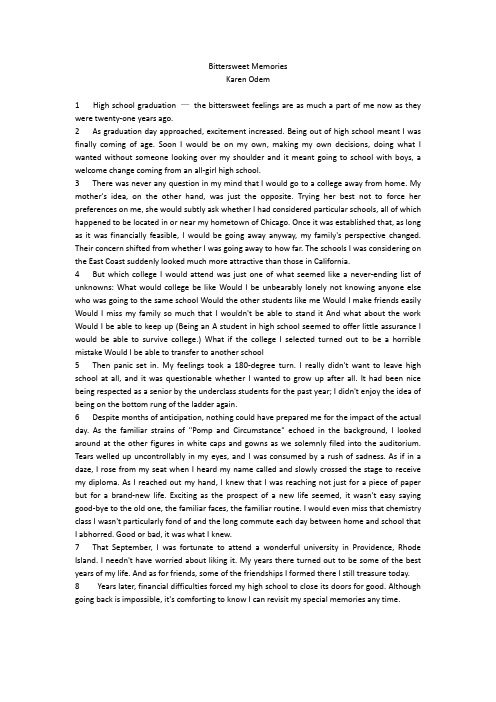
Bittersweet MemoriesKaren Odem1 High school graduation —the bittersweet feelings are as much a part of me now as they were twenty-one years ago.2 As graduation day approached, excitement increased. Being out of high school meant I was finally coming of age. Soon I would be on my own, making my own decisions, doing what I wanted without someone looking over my shoulder and it meant going to school with boys, a welcome change coming from an all-girl high school.3 There was never any question in my mind that I would go to a college away from home. My mother's idea, on the other hand, was just the opposite. Trying her best not to force her preferences on me, she would subtly ask whether I had considered particular schools, all of which happened to be located in or near my hometown of Chicago. Once it was established that, as long as it was financially feasible, I would be going away anyway, my family's perspective changed. Their concern shifted from whether I was going away to how far. The schools I was considering on the East Coast suddenly looked much more attractive than those in California.4 But which college I would attend was just one of what seemed like a never-ending list of unknowns: What would college be like Would I be unbearably lonely not knowing anyone else who was going to the same school Would the other students like me Would I make friends easily Would I miss my family so much that I wouldn't be able to stand it And what about the work Would I be able to keep up (Being an A student in high school seemed to offer little assurance I would be able to survive college.) What if the college I selected turned out to be a horrible mistake Would I be able to transfer to another school5 Then panic set in. My feelings took a 180-degree turn. I really didn't want to leave high school at all, and it was questionable whether I wanted to grow up after all. It had been nice being respected as a senior by the underclass students for the past year; I didn't enjoy the idea of being on the bottom rung of the ladder again.6 Despite months of anticipation, nothing could have prepared me for the impact of the actual day. As the familiar strains of "Pomp and Circumstance" echoed in the background, I looked around at the other figures in white caps and gowns as we solemnly filed into the auditorium. Tears welled up uncontrollably in my eyes, and I was consumed by a rush of sadness. As if in a daze, I rose from my seat when I heard my name called and slowly crossed the stage to receive my diploma. As I reached out my hand, I knew that I was reaching not just for a piece of paper but for a brand-new life. Exciting as the prospect of a new life seemed, it wasn't easy saying good-bye to the old one, the familiar faces, the familiar routine. I would even miss that chemistry class I wasn't particularly fond of and the long commute each day between home and school thatI abhorred. Good or bad, it was what I knew.7 That September, I was fortunate to attend a wonderful university in Providence, Rhode Island. I needn't have worried about liking it. My years there turned out to be some of the best years of my life. And as for friends, some of the friendships I formed there I still treasure today.8 Years later, financial difficulties forced my high school to close its doors for good. Although going back is impossible, it's comforting to know I can revisit my special memories any time.A. Read the following statements carefully. Some of them are true, some are not. Write T or F in the space before each statement without turning back to the text.1.In spite of the passage of time, the author’s mixed feelings about her high school graduation have been kept alive.2. With graduation day drawing near, she was getting more and more excited.3. Young Karen Odom was looking forward to entering a college away from home and living a life totally on her own.4. Her parents, on the other hand, insisted that she go to a college or university located in or near her hometown.5. For no good reason at all, her excitement suddenly changed into anxiety and fear.6. On the actual graduation day, she was overcome by a sudden rush of sorrow.7. After graduation from high school, Karen had a wonderful time at a good university in the East.8. Although her high school was closed down years later Karen felt comforted because she thought she could revisit her alma mater (母校) in her mind any time.B. TEXT COMPREHENSION1. In this article the author mainly describes _____.A) the height of excitement during the months leading up to the big event —the graduation ceremonyB) her eagerness to go to a wonderful university far away from homeC) her mixed feelings during the months leading towards graduation and on the actual graduation dayD) her happiness to be admitted to a wonderful university where she spent some of the best years of her life2. To the author, high school graduation meant _____.A) she would become legally an adultB) she could stop taking boring chemistry classesC) she could start to enjoy an independent lifeD) all of the above3. The author's mother _____.A) did not care very much which college her daughter went toB) willingly allowed her to go to a college of her own choiceC) wished that she would study at a college or university close to homeD) was greatly disappointed when she decided to go to a college on the East Coast4. The clause “as long as it was financially feasible”(para. 3) could best be replaced by _____.A) if the expenses would not be too heavy a burden on the family budgetB) if the tuition and living expenses were not too highC) if financial aid of any sort was availableD) if the family could put up enough money to pay for the tuition5. Anticipation and excitement suddenly changed into anxiety and fear. Which of the following did the author NOT include as a reason for that changeA) The fact that she was a top student at high school did not necessarily mean that she was sure to enjoy a successful academic career in college.B) It might be hard for her to make friends under new circumstances.C) She might make a wrong choice and enter a university she did not like at all.D) Growing homesick might seriously affect her academic performance at college.6. “Being on the bottom rung of the ladder”(para. 5) means_____.A) “being a freshman —at the lowest level of an institution of higher learning”B) “being unpopular among her fellow students”C) “being looked down upon by the juniors and seniors”D) all of the above7. On the actual graduation day, _____.A) the familiar tune “Pomp and Circumstance”brought tears to her eyesB) when she reached out for her diploma, she knew clearly that open to her was a new stage in life, unknown and insecureC) she came to realize that she was so attached to her old schoolD) she went through the whole ceremony in a daze8. The author adopts _____ tone in writing this article.A) a seriousB) an emotionalC) a matter-of-factD) an exaggeratedC. VOCABULARY。
新世纪大学英语综合教程2课文翻译及课后答案完整版
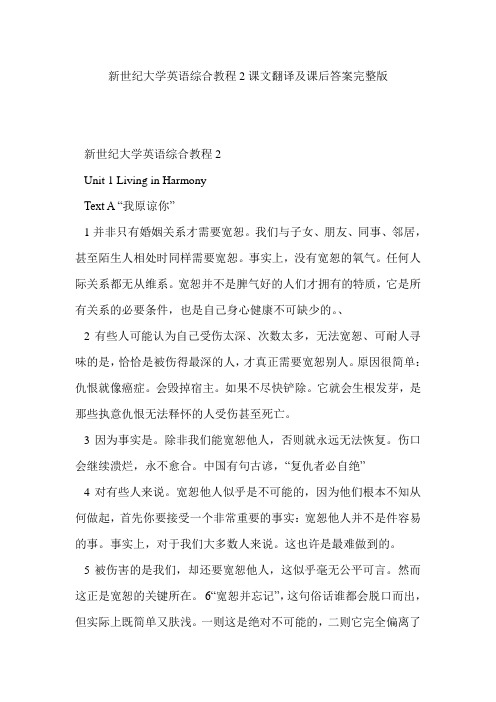
新世纪大学英语综合教程2课文翻译及课后答案完整版新世纪大学英语综合教程2Unit 1 Living in HarmonyText A “我原谅你”1并非只有婚姻关系才需要宽恕。
我们与子女、朋友、同事、邻居,甚至陌生人相处时同样需要宽恕。
事实上,没有宽恕的氧气。
任何人际关系都无从维系。
宽恕并不是脾气好的人们才拥有的特质,它是所有关系的必要条件,也是自己身心健康不可缺少的。
、2有些人可能认为自己受伤太深、次数太多,无法宽恕、可耐人寻味的是,恰恰是被伤得最深的人,才真正需要宽恕别人。
原因很简单:仇恨就像癌症。
会毁掉宿主。
如果不尽快铲除。
它就会生根发芽,是那些执意仇恨无法释怀的人受伤甚至死亡。
3因为事实是。
除非我们能宽恕他人,否则就永远无法恢复。
伤口会继续溃烂,永不愈合。
中国有句古谚,“复仇者必自绝”4对有些人来说。
宽恕他人似乎是不可能的,因为他们根本不知从何做起,首先你要接受一个非常重要的事实:宽恕他人并不是件容易的事。
事实上,对于我们大多数人来说。
这也许是最难做到的。
5被伤害的是我们,却还要宽恕他人,这似乎毫无公平可言。
然而这正是宽恕的关键所在。
6“宽恕并忘记”,这句俗话谁都会脱口而出,但实际上既简单又肤浅。
一则这是绝对不可能的,二则它完全偏离了宽恕的真正含义。
生活中最需要宽恕的事正是那些无法忘记的事。
我们不应把这些事掩饰起来,而需记住它们,并有意不因此对做过这些事的人怀有成见,然后继续生活。
7这就是为什么有的时候会感到:宽恕别人,一开始会相对容易些,难的是每次你看到那个人,与他谈话,甚至只是想起他之后如何控制自己的感情。
真正的宽恕不是一劳永逸之举,而是持久的情感面对。
8等待越久,宽恕就越难。
实际上,时间不会愈合伤口,只会让愤懑和仇恨更长时间地吞噬你的内心。
如果要等待“适当的时候”,你也许永远都找不到机会。
9开始运用宽恕的艺术之前,你先要问自己这样一个问题:我们中有多少人在特定的场合下是完全无辜的呢?10几年前,我和妻子买了一件便宜家具。
新世纪大学英语(第二版)综合课程2unit1课文翻译和课后答案
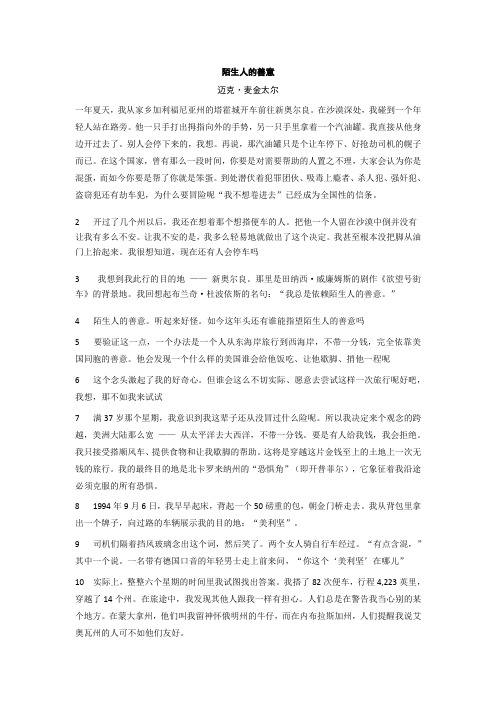
陌生人的善意迈克·麦金太尔一年夏天,我从家乡加利福尼亚州的塔霍城开车前往新奥尔良。
在沙漠深处,我碰到一个年轻人站在路旁。
他一只手打出拇指向外的手势,另一只手里拿着一个汽油罐。
我直接从他身边开过去了。
别人会停下来的,我想。
再说,那汽油罐只是个让车停下、好抢劫司机的幌子而已。
在这个国家,曾有那么一段时间,你要是对需要帮助的人置之不理,大家会认为你是混蛋,而如今你要是帮了你就是笨蛋。
到处潜伏着犯罪团伙、吸毒上瘾者、杀人犯、强奸犯、盗窃犯还有劫车犯,为什么要冒险呢“我不想卷进去”已经成为全国性的信条。
2 开过了几个州以后,我还在想着那个想搭便车的人。
把他一个人留在沙漠中倒并没有让我有多么不安。
让我不安的是,我多么轻易地就做出了这个决定。
我甚至根本没把脚从油门上抬起来。
我很想知道,现在还有人会停车吗3 我想到我此行的目的地——新奥尔良。
那里是田纳西·威廉姆斯的剧作《欲望号街车》的背景地。
我回想起布兰奇·杜波依斯的名句:“我总是依赖陌生人的善意。
”4 陌生人的善意。
听起来好怪。
如今这年头还有谁能指望陌生人的善意吗5 要验证这一点,一个办法是一个人从东海岸旅行到西海岸,不带一分钱,完全依靠美国同胞的善意。
他会发现一个什么样的美国谁会给他饭吃、让他歇脚、捎他一程呢6 这个念头激起了我的好奇心。
但谁会这么不切实际、愿意去尝试这样一次旅行呢好吧,我想,那不如我来试试7 满37岁那个星期,我意识到我这辈子还从没冒过什么险呢。
所以我决定来个观念的跨越,美洲大陆那么宽——从太平洋去大西洋,不带一分钱。
要是有人给我钱,我会拒绝。
我只接受搭顺风车、提供食物和让我歇脚的帮助。
这将是穿越这片金钱至上的土地上一次无钱的旅行。
我的最终目的地是北卡罗来纳州的“恐惧角”(即开普菲尔),它象征着我沿途必须克服的所有恐惧。
8 1994年9月6日,我早早起床,背起一个50磅重的包,朝金门桥走去。
我从背包里拿出一个牌子,向过路的车辆展示我的目的地:“美利坚”。
新世纪大学英语综合教程2Unit2TextA课文翻译
Unit 2 Text A Three Days to See看见东西的三天海伦·凯勒1 我们大家都读过一些令人激动的故事,这些故事里的主人公仅仅活在有限并且特定的时间内,有时长达一年,有时短到24小时。
但我们总是有兴趣发现,那命中注定要死的是那些有选择自由的人,而不是那些活动范围被严格限定了的判了刑的犯人。
2 这样的故事让我们思考,在相似的情况下,我们该怎么办,作为终有一死的人,在那最终的几个小时内安排什么事件,什么经历,什么交往?在回顾往事时,我们该找到什么快乐?什么悔恨?3 有时我想到,过好每一天是个非常好的习惯,似乎我们明天就会死去。
这种态度鲜明地强调了生命的价值。
我们应该以优雅、精力充沛、善知乐趣的方式过好每一天。
而当岁月推移,在经常瞻观未来之时日、未来之年月中,这些又常常失去。
当然,也有人愿按伊壁鸠鲁的信条“吃、喝和欢乐”去生活。
(译注:伊壁鸠鲁是古希腊哲学家,他认为生活的主题目的是享乐,而最高的享受唯通过合理的生活,如自我控制才能得到。
因为生活享受的目的被过分强调,而达此目的之手段被忽视,所以伊壁鸠鲁的信徒现今变为追求享乐的人。
他们的信条是:“让我们吃喝,因为明天我们就死亡”),但绝大多数人还是被即将面临死亡的必然性所折磨。
4 但是,我们大多数人把生活认为是理所当然的。
我们知道,某一天我们一定会死,但通常我们把那天想象在遥远的将来。
当我们心宽体健时,死亡几乎是不可想象的,我们很少想到它。
时日在无穷的展望中延展着,于是我们干着琐碎的事情,几乎意识不到我们对生活的倦怠态度。
5 恐怕,同倦的懒散也成为利用我们所有的本能和感觉的特点。
只有聋子才珍惜听力,唯有瞎子才体会到能看见事物的种种幸福,这种结论特别适合于那些在成年阶段失去视力和听力的人们,而那些从没有遭受视觉或听觉损伤之苦的人却很少充分利用这些天赐的官能。
他们模模糊糊地眼观八方,耳听各音,毫无重点,不会鉴赏,还是那相同的老话,对我们所有的官能不知珍惜,直至失去它,对我们的健康意识不到,直至生病时。
2世纪大学英语读写第一册unit1TEXT B 课文及课后题
Bittersweet MemoriesKaren Odem1 High school graduation —the bittersweet feelings are as much a part of me now as they were twenty-one years ago.2 As graduation day approached, excitement increased. Being out of high school meant I was finally coming of age. Soon I would be on my own, making my own decisions, doing what I wanted without someone looking over my shoulder and it meant going to school with boys, a welcome change coming from an all-girl high school.3 There was never any question in my mind that I would go to a college away from home. My mother's idea, on the other hand, was just the opposite. Trying her best not to force her preferences on me, she would subtly ask whether I had considered particular schools, all of which happened to be located in or near my hometown of Chicago. Once it was established that, as long as it was financially feasible, I would be going away anyway, my family's perspective changed. Their concern shifted from whether I was going away to how far. The schools I was considering on the East Coast suddenly looked much more attractive than those in California.4 But which college I would attend was just one of what seemed like a never-ending list of unknowns: What would college be like? Would I be unbearably lonely not knowing anyone else who was going to the same school? Would the other students like me? Would I make friends easily? Would I miss my family so much that I wouldn't be able to stand it? And what about the work? Would I be able to keep up? (Being an A student in high school seemed to offer little assurance I would be able to survive college.) What if the college I selected turned out to be a horrible mistake? Would I be able to transfer to another school?5 Then panic set in. My feelings took a 180-degree turn. I really didn't want to leave high school at all, and it was questionable whether I wanted to grow up after all. It had been nice being respected as a senior by the underclass students for the past year; I didn't enjoy the idea of being on the bottom rung of the ladder again.6 Despite months of anticipation, nothing could have prepared me for the impact of the actual day. As the familiar strains of "Pomp and Circumstance" echoed in the background, I looked around at the other figures in white caps and gowns as we solemnly filed into the auditorium. Tears welled up uncontrollably in my eyes, and I was consumed by a rush of sadness. As if in a daze, I rose from my seat when I heard my name called and slowly crossed the stage to receive my diploma. As I reached out my hand, I knew that I was reaching not just for a piece of paper but for a brand-new life. Exciting as the prospect of a new life seemed, it wasn't easy saying good-bye to the old one, the familiar faces, the familiar routine. I would even miss that chemistry class I wasn't particularly fond of and the long commute each day between home and school thatI abhorred. Good or bad, it was what I knew.7 That September, I was fortunate to attend a wonderful university in Providence, Rhode Island. I needn't have worried about liking it. My years there turned out to be some of the best years of my life. And as for friends, some of the friendships I formed there I still treasure today.8 Years later, financial difficulties forced my high school to close its doors for good. Although going back is impossible, it's comforting to know I can revisit my special memories any time.A. Read the following statements carefully. Some of them are true, some are not. Write T or F in the space before each statement without turning back to the text.1.In spite of the passage of time, the author’s mixed feelings about her high school graduation have been kept alive.2. With graduation day drawing near, she was getting more and more excited.3. Young Karen Odom was looking forward to entering a college away from home and living a life totally on her own.4. Her parents, on the other hand, insisted that she go to a college or university located in or near her hometown.5. For no good reason at all, her excitement suddenly changed into anxiety and fear.6. On the actual graduation day, she was overcome by a sudden rush of sorrow.7. After graduation from high school, Karen had a wonderful time at a good university in the East.8. Although her high school was closed down years later Karen felt comforted because she thought she could revisit her alma mater (母校) in her mind any time.B. TEXT COMPREHENSION1. In this article the author mainly describes _____.A) the height of excitement during the months leading up to the big event —the graduation ceremonyB) her eagerness to go to a wonderful university far away from homeC) her mixed feelings during the months leading towards graduation and on the actual graduation dayD) her happiness to be admitted to a wonderful university where she spent some of the best years of her life2. To the author, high school graduation meant _____.A) she would become legally an adultB) she could stop taking boring chemistry classesC) she could start to enjoy an independent lifeD) all of the above3. The author's mother _____.A) did not care very much which college her daughter went toB) willingly allowed her to go to a college of her own choiceC) wished that she would study at a college or university close to homeD) was greatly disappointed when she decided to go to a college on the East Coast4. The clause “as long as it was financially feasible”(para. 3) could best be replaced by _____.A) if the expenses would not be too heavy a burden on the family budgetB) if the tuition and living expenses were not too highC) if financial aid of any sort was availableD) if the family could put up enough money to pay for the tuition5. Anticipation and excitement suddenly changed into anxiety and fear. Which of the following did the author NOT include as a reason for that change?A) The fact that she was a top student at high school did not necessarily mean that she was sure to enjoy a successful academic career in college.B) It might be hard for her to make friends under new circumstances.C) She might make a wrong choice and enter a university she did not like at all.D) Growing homesick might seriously affect her academic performance at college.6. “Being on the bottom rung of the ladder”(para. 5) means_____.A) “being a freshman —at the lowest level of an institution of higher learning”B) “being unpopular among her fellow students”C) “being looked down upon by the juniors and seniors”D) all of the above7. On the actual graduation day, _____.A) the familiar tune “Pomp and Circumstance”brought tears to her eyesB) when she reached out for her diploma, she knew clearly that open to her was a new stage in life, unknown and insecureC) she came to realize that she was so attached to her old schoolD) she went through the whole ceremony in a daze8. The author adopts _____ tone in writing this article.A) a seriousB) an emotionalC) a matter-of-factD) an exaggeratedC. VOCABULARY。
新世纪大学英语综合教程第2册Unit 1 Living in Harmony
sympathy All eyes in the restaurant Then I was suddenly filled with _________.
judging my every action I smiled and asked the were set on me, ____________________. more breakfast meals on young lady behind the counter to give me two ____________________
Background Information
Vocabulary Exercises
Get Started
◇Discuss the following brainstorming question in groups .
Are you willing to help out a stranger? Why or why not?
First you need to state your opinions before
you start to give reasons.
I have 2/3/4 reasons for my choice/decision.. To begin with/ To start with / Firstly... Because.../The main reason is that.. Ending. (Ye, that's pretty much I can think..)
Listen and Respond
Smile
I am a mother of three and have recently completed my _____________. college degree
新世纪大学英语(第二版)综合教程2翻译
新世纪大学英语综合教程2翻译部分Unit 11) 离婚的传言不过是为他的新电影炒作的手段而已。
(a ploy to do sth.)The rumor about his divorce is just a ploy to gain publicity for his new film.2) 他孤注一掷,用父母留给他的所有钱来开一家工厂。
(take a gamble on sth.)He took a gamble on starting a factory with all the money his parents had left him.3) 赢得那场重要的比赛之后,他们把队长抬到肩膀上,欢呼着胜利。
(hoist ... to ...)After winning the important game they hoisted their captain to their shoulders in shouting triumph.4) 在全球化热潮中,我们要提防不同文化的冲突。
(watch out for sth.)In the rush to go for globalization, we should watch out for collision of cultures.5) 在这种情况下,出现麻烦是不足为奇的。
(in the circumstances)In the circumstances it was not surprising that there was trouble.6) 这婴儿非常健康。
(the picture of)The baby is the very picture of health.7) 人们已经意识到儿童接触有关暴力和色情电视节目的危害。
(expose sb. to sth. )People have realized the dangers of exposing children to violence and sex on TV.8) 我们始终考虑到我们是在为谁制作这部影片。
- 1、下载文档前请自行甄别文档内容的完整性,平台不提供额外的编辑、内容补充、找答案等附加服务。
- 2、"仅部分预览"的文档,不可在线预览部分如存在完整性等问题,可反馈申请退款(可完整预览的文档不适用该条件!)。
- 3、如文档侵犯您的权益,请联系客服反馈,我们会尽快为您处理(人工客服工作时间:9:00-18:30)。
Unit 1 Book 3Do you remember your first love? All those exciting and wonderful new emotions – the way your heart raced when that special person was near – those anxious, awkward moments when you didn't know what to say or do? And then (for most of us) that sad moment when for one reason or another it all came to an end … Ernest Hemingway once said, "Every love story ends as a tragedy" – but the authors of the texts in this unit have a different point of view. Text A focuses on the unexpected side effects of the author's first venture into romance, while Text B recalls the ups and downs of the author's great love for … his car! Finally, the authors of Text C offer some fascinating advice about how to successfully navigate romantic relationships.Text A How I Got SmartA common misconception among youngsters attendingschool is that their teachers were child prodigies. Who else but abookworm, with none of the normal kid's tendency to playrather than study, would grow up to be a teacher anyway?I've tried desperately to explain to my students that theimage they have of me as an enthusiastic devotee of books and homework during my adolescence was a bit out of focus. On the contrary, I hated compulsory education with a passion. I could never quite accept the notion of having to go to school while the fish were biting.But in my sophomore year, something beautiful and exciting happened. Cupid aimed his arrow and struck me right in the heart. All at once, I enjoyed going to school, if only to gaze at the lovely face in English II.My princess sat near the pencil sharpener, and that year I ground up enough pencils to fuel a campfire. Alas, Debbie was far beyond my wildest dreams. We were separated not only by five rows of desks, but by about 50 I.Q. points. She was the top student in English II, the apple of Mrs. Larrivee's eye.Occasionally, Debbie would catch me staring at her, and she would flash a smile that radiated intelligence and quickened my heartbeat. It was a smile that signaled hope and mademe temporarily forget the intellectual gulf that separated us.I schemed desperately to bridge that gulf. And one day, as I waspassing the supermarket, an idea came to me. A sign in the windowannounced that the store was offering the first volume of a set ofencyclopedias at the special price of 29 cents. The remainingvolumes would cost $2.49 each.I purchased Volume I -- Aardvark to Asteroid -- and began myventure into the world of knowledge. I would henceforth become a seeker of facts. I would become Chief Brain in English II and sweep my princess off her feet with a surge of erudition. Ihad it all planned.My first opportunity came one day in the cafeteria line. I lookedbehind me and there she was.“Hi,” she sai d.After a pause, I wet my lips and said, “Know where anchoviescome from?”She seemed surprised. “No, I don't.”I breathed a sigh of relief. “The anchovy lives in salt water and is rarely found in fresh water.” I had to talk fast, so that I co uld get all the facts in before we reached the cash register. “Fishermen catch anchovies in the Mediterranean Sea and along the Atlantic coast near Spain and Portugal.”“How fascinating,” said Debbie, shaking her head in disbelief. It was obvious that I hadmade quite an impression.A few days later, during a fire drill, I casually went up to her andasked, “Ever been to the Aleutian Islands?”“Never have,” she replied.“Might be a nice place to visit, but I certainly wouldn't want tolive there,” I said.“Why not?” said Debbie, playing right into my hands.“Well, the climate is forbidding. There are no trees on any of the 100 or more islands in the group. The ground is rocky and very little plant life can grow on it.”“I don't think I'd even care to visit,” she said.The fire drill was over and we began to file into the building, so I had to step it up to get the natives in. “The Aleuts are short and sturdy and have dark skin and black hair. They live on fish, and they trap blue foxes and seals for their valuable fur.”Debbie's eyes widened in amazement.One day I was browsing through the library. I spotted Debbie sittingat a table, absorbed in a crossword puzzle. She was frowning,apparently stumped on a word. I leaned over and asked if I could help.“Four-letter word for Oriental female servant,” Debbie said.“Try amah,” I said, quick as a flash.Debbie filled in the blanks, then turned to stare at me in amazement. “I don't believe it,” she said. “I just don't believe it.”And so it went, that glorious, joyous, romantic sophomore year. Debbie seemed to relish our little conversations and hung on my every word. Naturally, the more I read, the more myconfidence grew.In the classroom, too, I was gradually making my presence felt. Oneday, during a discussion of Coleridge's “The Ancient Mariner”, we cameacross the word albatross.“Can anyone tell us what an albatross is?” asked Mrs. Larrivee.My hand shot up. “The albatross is a large bi rd that lives mostly in the ocean regions below the equator, but may be found in the north Pacific as well. The albatross measures as long as four feet and has the greatest wingspread of any bird. It feeds on fish and shellfish. The albatross has an enormous appetite, and when it's full it has trouble getting into the air again.”There was a long silence in the room. Mrs. Larrivee couldn't quite believe what she had just heard. I sneaked a look at Debbie and gave her a big wink. She beamed proudly and winkedback.What I failed to perceive was that Debbie all this while was goingsteady with a junior from a neighboring school -- a basketball player witha C+ average. The revelation hit me hard, and for a while I felt likeforgetting everything I had learned. I had saved enough money to buyVolume II --Asthma to Bullfinch -- but was strongly tempted to invest in abasketball instead.I felt not only hurt, but betrayed. Like Agamemnon, but with lessdrastic consequences, thank God.In time I recovered from my wounds. The next year Debbie moved from the neighborhood and transferred to another school. Soon she became nomore than a memory.Although the original incentive was gone, I continued poring over the encyclopedias, as well as an increasing number of other books. Having tasted of the wine of knowledge, I could not now alter my course. For:“A little knowledge is a dangerous thing:Drink deep, or taste not the Pierian spring.”So wrote Alexander Pope, Volume XIV -- Paprika to Pterodactyl.斯蒂夫· 普罗迪上学的孩子们中间有一种普遍的错误想法,即认为他们的老师当年都是些神童。
